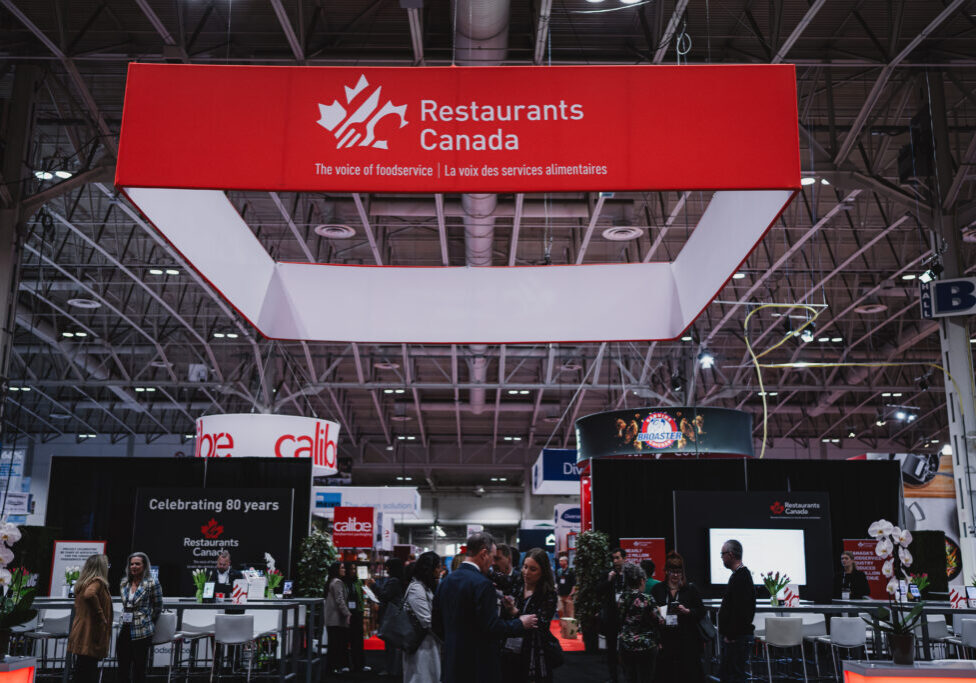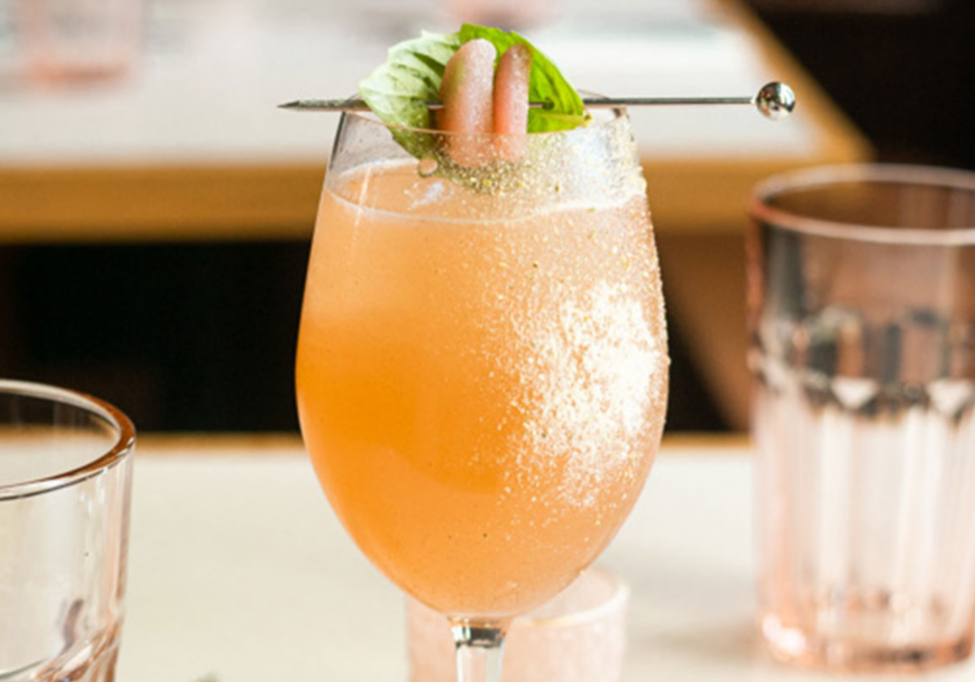Setting the Stage for the Next Generation to Shine
Meet Jasmine Baker, RC Show Culinary Curator

As RC Show’s renowned Culinary Curator, Jasmine Baker directs every detail of the Culinary Stage, in-Show and satellite events, the busy RC Pop Up Experience, and an array of engaging culinary competitions, from the Garland Canada Culinary Competition and Restaurants Canada Pizza Competition to the all-new Breakfast Sandwich showdown. Working as an extension of the RC Show team, she also coordinates a full roster of experienced event and culinary professionals who work with her company, EVNT MGMT.
With a deep passion for showcasing emerging talent and elevating the culinary landscape honed over years working within and beyond brick-and-mortar restaurants and the broader entertainment industry, Jasmine brings a unique blend of creativity, operational expertise, and an unwavering commitment to inclusivity. In this interview, she shares insights into her role, the evolving demands of live culinary competitions, and the inspiration behind her work.
When she’s not spinning dozens of plates behind the scenes at RC Show, you’ll find her in her new home in Prince Edward Country, crafting expert recipes and finding delicious ways to bring the hospitality community together.
RC Show: Your portfolio is huge… Can you tell us a little bit about your background and your role at RC Show?
Jasmine Baker: We manage all things culinary for the RC Show. This includes the Culinary Stage and the planning and production involved, as well as all the culinary competitions. We also oversee the Bar & Beverage Stage production and coordination, The Workshop, as well as RC Show on and off-site events, and the RC Pop Up Experience, which includes a new Chef’s Table speaking and demo stage, an event and reception space, and food and beverage service. It’s a big role that’s grown over the years. We started with the events in 2019 and then took on the Garland Canada Culinary Competition in 2020, which was our first competition at RC Show, and each year the opportunities and role have expanded.
We have worked closely with Garland Canada and RC Show to develop a competition template and resource toolkit, covering criteria for both applicants and judging. For 2021, we had to pivot the competition to a fully remote format due to lockdowns, so we transitioned to a virtual cooking competition—no small feat. In 2022, we moved to a hybrid model with the final round live, and then returned to a fully live format last year.
I’d say Restaurants Canada has become a leader in culinary competitions nationally. Now we have the Restaurants Canada Pizza Competition, which features traditional pizza entries one day and creative pizzas the next, and last year’s Fried Chicken Sandwich Competition was wildly successful. This year, we’re reimagining it for breakfast sandwiches. We aim to spotlight different, on-trend items that are making waves for operators.
RCS: I’d love to dive deeper into this. You mentioned on-trend menu items—what led to the choice of a breakfast sandwich for this year’s competition?
JB: Great question. In foodservice and hospitality, cafes and baristas are emerging as dynamic success stories. Breakfast sandwiches have become an all-day offering. They’re low-maintenance in terms of equipment and are boosting the guest cheque average for cafés. Where previously you’d see an average of $5–$8 per customer, now, with breakfast sandwiches, cafés are seeing $12-$25 per customer. It’s a great revenue booster, and we wanted to spotlight the potential of that.
RCS: Will the annual focus always be on a type of sandwich for this competition, or could it shift to other trending items?
JB: I think it’ll focus on whatever menu items are trending. We want to share what’s innovative and inspiring with RC Show attendees and the industry as a whole. So, it could be sandwiches, but it could also be tacos, fries, platters or towers —whatever is driving change and excitement in the industry.
RCS: Generally speaking, what makes a great competitor? What qualities or attributes help young culinarians stand out on the stage?
JB: For me, it’s always about passion—someone truly committed to their craft and eager to challenge themselves. Some of our most dynamic chefs over the years didn’t place initially, but they returned and eventually won or went on to do incredible things. The experience pushes them to grow, and they’re there not just to win but to learn and evolve.
RCS: Beyond gaining experience and the opportunity to hear feedback from seasoned chefs and professionals, how does public competition help young culinarians grow?
JB: The competition experience shows emerging chefs they can achieve high standards. They’re often not at the executive chef level yet, so the competition tests their business acumen, ingredient use and waste management—elements they may not manage daily in their roles. The experience prepares them for bigger opportunities, whether within their current organization or beyond.
They’re being tested and observed for their knife skills and their culinary skills—their hard skills. We’re asking them to tap into their business acumen, and that’s a muscle they need to learn how to flex, especially for anybody looking to succeed and overcome the challenges the industry is currently facing, especially with soaring food prices.
Also, we don’t get many women applying, but we reserve at least 50 per cent of competitor slots for women and equity-deserving chefs. I’ve found that a lot of women need convincing to compete—they often don’t feel like they belong on that stage. But once they do, I see a significant boost in their confidence.
RCS: What are some reasons women chefs may hesitate to compete?
JB: Until we mandated space for women and equity-deserving chefs, these stages were often dominated by White men, so many women didn’t see themselves represented among competitors or judges. Seeing yourself represented makes a difference, and diversifying judging panels has also been part of our strategy. It’s a cultural reality—seeing a woman you admire on stage allows you to imagine yourself there.
RCS: That was a decisive move for Garland Canada and Restaurants Canada. Was that shift difficult?
JB: We had to ask tough questions of ourselves, and it did require reserving space and working harder to attract underrepresented chefs. I’ve done similar work at The Royal Winter Fair and Tastemaker Toronto. While initially, you see resistance, if you’re intentional and communicate well, it works. Garland Canada and Restaurants Canada embraced this wholeheartedly, and it’s paid off—we’re now serving a wider community, and the conversations are richer for it.
RCS: It sounds like it’s not just about doing the right thing but about acknowledging the next generation of foodservice leaders, is that fair to say?
JB: Yes, absolutely. It started as a response to the cultural moment, but the talent we’ve attracted has genuinely elevated the competition. It’s also widened Restaurants Canada’s accessibility to the industry. The hospitality industry faces talent retention challenges, and creating space for underrepresented groups is one way to address that.
RCS: What goes into selecting judges? What are you looking for in a panel?
JB: We look for individuals with competition experience, either as past competitors or judges. Being a judge is demanding—they must be laser-focused on technique and taste throughout the competition, which can mean sampling a dozen dishes in one day. We aim to diversify the panel across industry sectors, with chefs from typical kitchen brigades and others from catering, events, or even authorship. Chef John Higgins has led our panel for years, bringing expertise both as a judge and an educator, which enriches the feedback competitors receive.
RCS: How do you incorporate unique challenges, themes, or ingredients into each competition to keep things fresh?
JB: We weave the show’s theme into the criteria each year, making part of the storytelling on the plate. Recently, we’ve asked chefs to draw inspiration from their childhood or early career, helping them reconnect with their “why.” We work closely with product sponsors to curate a balanced product mix, allowing creativity to thrive within the competition’s constraints.
This year, for the Garland Canada Culinary Competition, we still want to hear the chefs’ stories, but we’re also asking them to create a dish that is really going to fuel their bottom line. We want them to create and present a dish to the judges that is going to be a top seller on the menu, and a rationale to explain why it’s a winner. To be a winner, it’s going to have to have a good profit margin, minimal waste and be on-trend and very exciting.
RCS: Logistically, what are the biggest challenges of hosting live culinary competitions, and how do you tackle them?
JB: Live events with food are complex. Anything can happen, so we prepare extensively, from stage setup to coordinating a full team behind the scenes. Clear communication is crucial for competitors, judges, hosts, and partners. It’s something we’re always improving.
RCS: And finally, what role does the audience play?
JB: The audience brings the energy—they’re cheering on competitors and adding to the excitement, which balances out the pressure of performing live. For the audience, it’s a chance to see Canada’s top emerging chefs, learn new culinary techniques, and sometimes even sample what’s being created on stage.
RCS: What aspect of your role as Culinary Curator are you most proud of?
JB: My biggest joy comes from watching young chefs push themselves out of their comfort zone and come away with a deeper love for their craft. As someone who started her career in culinary and hospitality operations, I feel a particular sense of pride seeing young female chefs take their rightful place on the stage.
In addition, seeing how these talented young chefs excel in their careers, fires me up. I keep track of all our competitors, their journeys and achievements. One of our chefs went on to work at Noma, while another took an executive chef role in Australia. Seeing each of them strive and thrive inspires me constantly
Follow Jasmine Baker @jasminebakerlife @evnt___mgmt
Learn more about competing in the RC Show 2025 Culinary, Coffee and Bar & Beverage competitions here.
Get your RC Show pass to cheer on your peers here.
ABOUT THE AUTHOR
Read More
Rent for the Event
Element Event Solutions is raising the bar for event experiences from coast to coast. From support, collaboration, and creativity, they are constantly inspired to keep pushing boundaries and delivering unforgettable moments.



